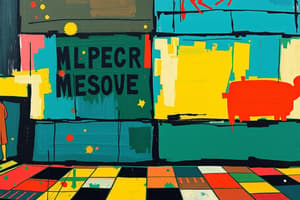Podcast
Questions and Answers
What is the primary role of electoral institutions in a democracy?
What is the primary role of electoral institutions in a democracy?
Which of the following is a key role of political parties in a democracy?
Which of the following is a key role of political parties in a democracy?
How do institutions promote public trust in a democracy?
How do institutions promote public trust in a democracy?
What is one way citizens can hold institutions accountable in a democracy?
What is one way citizens can hold institutions accountable in a democracy?
Signup and view all the answers
Which statement best describes the role of civil society organizations (CSOs) in a democracy?
Which statement best describes the role of civil society organizations (CSOs) in a democracy?
Signup and view all the answers
How do democratic institutions improve the quality of life for citizens?
How do democratic institutions improve the quality of life for citizens?
Signup and view all the answers
What is the primary role of the executive branch in a government?
What is the primary role of the executive branch in a government?
Signup and view all the answers
Which branch of government enacts laws and oversees the government?
Which branch of government enacts laws and oversees the government?
Signup and view all the answers
What does the judiciary branch mainly focus on within a country's legal framework?
What does the judiciary branch mainly focus on within a country's legal framework?
Signup and view all the answers
How do government institutions contribute to the effective operation of a democracy?
How do government institutions contribute to the effective operation of a democracy?
Signup and view all the answers
In a democracy, what is the primary function of democratic institutions?
In a democracy, what is the primary function of democratic institutions?
Signup and view all the answers
What is a key aspect of accountability in governmental institutions?
What is a key aspect of accountability in governmental institutions?
Signup and view all the answers
Study Notes
Understanding Institutional Functioning in Democracies
Institutions, whether governmental or democratic, play a pivotal role in shaping the societal fabric and the effective operation of a democracy. In this article, we'll delve into the crucial aspects of institutional functioning, exploring government institutions, democratic institutions, their interplay, accountability, and functions.
Government Institutions
Government institutions include the branches and agencies that carry out the mandate and governance of a country. Generally, these are the executive, legislative, and judicial branches. Each branch has distinct functions, and their interactions contribute to the harmonious operation of government and the state.
- Executive: The executive branch is responsible for implementing laws, executing policies, and managing the day-to-day administration of the government. This branch typically includes the president, prime minister, and other government ministers.
- Legislative: The legislative branch, or the Parliament, enacts laws and has the authority to oversee the government. Legislators represent their constituents' interests and pass laws that govern the country.
- Judicial: The judiciary branch is responsible for interpreting the law and administering justice. Judges, magistrates, and other judicial officers determine the legality of disputes, apply laws, and ensure that the rule of law is upheld.
Democratic Institutions
In democracies, citizens elect leaders who represent their interests, and these leaders are accountable to the people. Democratic institutions include various bodies that facilitate and support the democratic process.
- Electoral institutions: These include the bodies responsible for organizing, conducting, and overseeing elections, such as election commissions, electoral tribunals, and voter registration agencies.
- Political parties: Political parties are the primary channels through which citizens participate in the democratic process. Parties may be ideological, regional, or issue-focused, and they help to aggregate the interests of citizens and provide representation in government.
- Civil society: Civil society organizations (CSOs) include nongovernmental organizations, community-based organizations, and other groups that advocate for the rights and interests of citizens. CSOs play an essential role in democratic institutions by providing a platform for citizen participation and oversight.
Role of Institutions in a Democracy
Institutions serve as the backbone of democratic governance, fostering public trust, and ensuring the effective delivery of services. Here are some key roles institutions play in a democracy:
- Representation: Institutions are responsible for representing the interests and values of the people. They facilitate the expression and aggregation of citizens' preferences, and they use this input to make decisions.
- Accountability: Institutions are accountable to the people they represent. They are responsible for providing transparency, answering to the public, and addressing citizen concerns.
- Service delivery: Institutions are responsible for delivering essential services, including education, healthcare, and infrastructure. By providing these services, institutions help to improve the quality of life for citizens.
Accountability of Institutions
Institutions are accountable to the people they represent and to the law. There are several mechanisms through which citizens can hold institutions accountable, including:
- Elections: Citizens have the right to vote, and they can use this right to elect leaders who are responsive to their needs and values.
- Oversight: Citizens have the right to oversight, and they can use this right to monitor government activities and hold institutions accountable for their actions.
- Civil society: Civil society organizations (CSOs) play an essential role in institutional accountability by providing a platform for citizen participation and oversight. CSOs help to ensure that institutions are responsive to the needs and values of citizens.
Functions of Institutions
Institutions perform various functions that contribute to the effective operation of democracies. Here are some key functions of institutions:
- Policy formulation: Institutions are responsible for developing and implementing policies that address the needs of citizens and support the goals of the state.
- Service delivery: Institutions are responsible for delivering essential services, including education, healthcare, and infrastructure. By providing these services, institutions help to improve the quality of life for citizens.
- Conflict resolution: Institutions are responsible for resolving conflicts and ensuring that the rule of law is upheld. This function helps to maintain peace and stability within societies.
- Representation: Institutions are responsible for representing the interests and values of the people. They facilitate the expression and aggregation of citizens' preferences, and they use this input to make decisions.
- Accountability: Institutions are accountable to the people they represent and to the law. They are responsible for providing transparency, answering to the public, and addressing citizen concerns.
In conclusion, the functioning of institutions in democracies is crucial for fostering public trust, ensuring effective governance, and promoting a high quality of life for citizens. Government and democratic institutions, along with their interplay and accountability mechanisms, are essential for maintaining the health of democracies and ensuring their success.
Studying That Suits You
Use AI to generate personalized quizzes and flashcards to suit your learning preferences.
Description
Test your knowledge on the functioning of government and democratic institutions in democracies, including their roles, accountability mechanisms, and essential functions. Explore topics like executive, legislative, and judicial branches, electoral institutions, political parties, and civil society.




